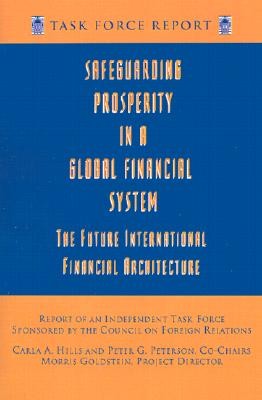
- We will send in 10–14 business days.
- Author: Morris Goldstein
- Publisher: Peterson Institute for International Economics
- ISBN-10: 0881322873
- ISBN-13: 9780881322873
- Format: 15.3 x 22.6 x 1 cm, minkšti viršeliai
- Language: English
- SAVE -10% with code: EXTRA
Safeguarding Prosperity in a Global Financial System (e-book) (used book) | bookbook.eu
Reviews
Description
This report contains the findings and recommendations of an independent blue-ribbon commission on the prevention and management of international financial crises. The commission was sponsored by the Council on Foreign Relations, and cochaired by Peter Peterson and Carla Hills, with the Institute's Morris Goldstein serving as project director. The membership is listed below. The report analyzes the main factors that give rise to banking, currency, and debt crises, and it proposes a set of interrelated recommendations for improving crisis prevention and resolution. It also explains why the United States, despite its impressive overall economic performance since the outbreak of the Asian crisis, has a large stake in the future international financial architecture. The commission's recommendations aim at altering the behavior of emerging-market borrowers and their private creditors in ways that would reduce the frequency and severity of crises. It includes specific proposals for rewarding countries that do better on crisis prevention; reducing vulnerabilities in the exchange rate systems of emerging economies; inducing private creditors to accept their fair share of the costs of crisis resolution; reforming the IMF's lending policies; and refocusing the mandates of the IMF and the World Bank on leaner agendas. Its recommendations range well beyond the decisions taken to date by the international financial community.
EXTRA 10 % discount with code: EXTRA
The promotion ends in 22d.01:55:44
The discount code is valid when purchasing from 10 €. Discounts do not stack.
- Author: Morris Goldstein
- Publisher: Peterson Institute for International Economics
- ISBN-10: 0881322873
- ISBN-13: 9780881322873
- Format: 15.3 x 22.6 x 1 cm, minkšti viršeliai
- Language: English English
This report contains the findings and recommendations of an independent blue-ribbon commission on the prevention and management of international financial crises. The commission was sponsored by the Council on Foreign Relations, and cochaired by Peter Peterson and Carla Hills, with the Institute's Morris Goldstein serving as project director. The membership is listed below. The report analyzes the main factors that give rise to banking, currency, and debt crises, and it proposes a set of interrelated recommendations for improving crisis prevention and resolution. It also explains why the United States, despite its impressive overall economic performance since the outbreak of the Asian crisis, has a large stake in the future international financial architecture. The commission's recommendations aim at altering the behavior of emerging-market borrowers and their private creditors in ways that would reduce the frequency and severity of crises. It includes specific proposals for rewarding countries that do better on crisis prevention; reducing vulnerabilities in the exchange rate systems of emerging economies; inducing private creditors to accept their fair share of the costs of crisis resolution; reforming the IMF's lending policies; and refocusing the mandates of the IMF and the World Bank on leaner agendas. Its recommendations range well beyond the decisions taken to date by the international financial community.


Reviews